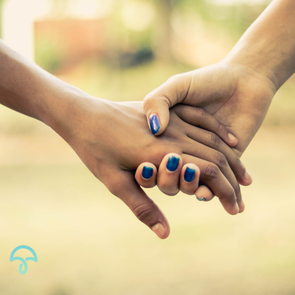What is Empathy? Empathy is our capacity to understand or feel what another person is experiencing, that is, the capacity to place oneself in another's position, considering their emotions and experiences. To get into the other person's shoes, as it is widely known. Empathy is innate to human beings and it is our neurological response to another person’s emotions. The response to what is felt by another person occurs automatically and often out of our conscious awareness. From an early age we are wired to experience what another person is feeling which provides essential learning cues and marks our successful development. The "as if" qualitySo how is our brain working in order to make the experience of empathy possible? Research has demonstrated that the same neural networks are being activated during the experience of real pain as to when observing someone else experiencing pain. A special set of neurons called ‘mirror neurons’ is what enables us to have a very similar experience to what another person is going through when feeling sadness, pain or joy. For example, in the scenario of seeing somebody being in pain in a hospital unit, even though nothing has physically harmed us, our brains register temporarily the emotional and physical pain of the other. Thus, we have the capacity to experience another person’s distress and discomfort as if they were our own but at the same time not losing the ‘as if’ quality of the experience. This distinction is important since it allows us to consider the possibility to help another person without focusing exclusively on our own discomfort. Empathy and Self-EmpathyEven though our brains are very much in sync with the brains of others, most of the times we have no conscious awareness of this process. In an imaginary scenario where we keep conscious awareness of others’ emotional experience at all times, our lives could simply become unbearable. To a different degree we all of us have experienced levels of emotional distress. However not all of us react with empathic concern for others even if we have experienced very similar circumstances. Why could that be? Most of us think of empathy as our capacity to respond and express the urge to care about another person’s welfare. However, this exhibit of empathy called empathic concern is actually a complicated equation with multiple variables beyond the empathic response. Empathic concern could be described as the ‘behavioral’ aspect of empathy because it can lead to compassionate acts but it can also lead to the experience of distress. When we are faced with too much distress we are not are less likely to engage in empathic concern but we are rather likely to engage in avoidance. Some experts have suggested that when a problem is becoming overwhelming on an individual or a group level we may begin to feel compassion fatigue and simply cease to process the problem because of its increased emotional valence. Think about our response to wars, climate change or gender or racial violence - there are all problems to our society but despite their striking relevance these topics are often dismissed on a personal, national and international level. However, what happens in the world is only a projection of our own internal realities. Related:So, what could be the reasons for our lack of empathic concern? The answer is certainly not simple. Blaming the loser, the victim and the inadequate or other who is different from us means that we are ready to label in order to distinguish ourselves but at the same time it also means that we are not ready to recognize our own pain. Blame and judgment as much as empathic concern are all reactions triggered by our empathic response to someone else’s emotional experience. But there is one big difference. People that are expressing empathic concern towards others are usually able to accept their own pain - the fact that they have been hurt, struggling, they have been wronged, treated unfairly …The list goes on but in reality the ability to recognize and process our own pain makes us more susceptible to be compassionate towards others and more open to offer a helping hand. However, if the pain that we have endured has been intense but has also remained unprocessed because we have been deprived of empathic concern in our family environment, it is very likely that we have had no way to learn how to process our hurt. For this reason, we might lack the ability to be compassionate towards ourselves and others and instead we become harsh, judgemental or even harmful in a subconscious attempt to deal with our pain. This reenactment keeps us stuck in a loop of denial, anger and essentially lack of connection and compassion which prevents us from moving on. What can we do to break the (non-empathic) loop?1. Recognise our emotionsIn order to be able to positively influence your actions, we need to be aware of our experiences. Recognizing and naming our emotions actually allows us to respond to them with awareness and intention. With recognizing our emotions, we validate our experience and create a space to process it more efficiently. For example, there is a huge difference between "feeling bad" and "feeling hurt’’. In the first case, there is an undifferentiated feeling ("bad") that can relate to a variety of emotional experiences. This leaves us wondering in the fizzy fog of emotional unawareness. Accordingly, taking constructive action becomes much more difficult. When we are able to name our experience in an accurate, clear and validating way we are better equipped to understand it. Additionally, in this way we are able to distinguish ourselves from our emotional experience so that you can observe and experience it from a safer distance. Identifying and naming our emotions is the first step to emotional regulation. 2. Building Self-Compassion: being imperfect is inevitableBuilding a non- judgemental attitude towards our own emotions and experiences is the key for compassion. Self-compassion entails being warm and understanding toward ourselves when we suffer, fail, or feel inadequate, rather than ignoring our pain or getting lost in self-criticism. Self-compassionate people recognize that being imperfect, failing, and experiencing life difficulties is inevitable, so they tend to be gentle with themselves when confronted with painful experiences rather than getting angry when life falls short. When the reality of painful experiences is denied or fought against suffering increases in the form of stress, frustration and self-criticism. When this reality is accepted with sympathy and kindness we experience greater emotional equanimity. Related:3. Pass it forwardUsing our painful experiences to connect with others is one of the greatest achievements of humanity. Instead of falling into isolation we can recognize that suffering and personal inadequacy are a part of the shared human experience – something that we all go through rather than being something that happens to “me” alone. This attitude can heal our emotional wounds and alienation through connect to others and in this way we can pass forward what we refer to as empathy. Related:Take Action!
Resources:
Written by Rositsa Stoycheva
0 Comments
Your comment will be posted after it is approved.
Leave a Reply. |
Therapy |
|
